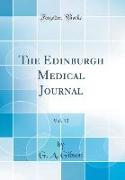The Edinburgh Medical Journal, Vol. 12 (Classic Reprint)
BücherAngebote / Angebote:
Excerpt from The Edinburgh Medical Journal, Vol. 12By the endowment of Research Fellowships, provision could readily be made for the support and encouragement of those engaged in research. These fellowships might be made tenable for seven to ten years, with the possibility of re-election for a similar period, subsequent to which, if the holder had established a reputation as a man of ability and distinction, he might be appointed a Life Fellow, and the Life Fellowships, pecuniarily more valuable, might then be known as Extraordinary or Research Professorships. In this way, a really good man would be relieved of all the anxiety of mere bread winning, whilst his association with the University would promote its reputation and renown. On the other hand, such an arrangement would prevent the University being burdened with the support of men who had failed to rise to the first rank, since, having once given them the opportunity of distinguishing themselves, the authorities would, of course, be justified in declining to re-elect fellows who had failed to make good their claims to distinction.The adoption of some such arrangement would not necessarily imply that research would be confined to one class of University professors and that the others would be teachers only, for there would be nothing to prevent the latter devoting what spare time they had at their disposal to the pursuance of original research, only it would insure that no man who had raised himself to eminence by the brilliance of his researches would be called upon to undertake duties which would be irksome to him, and for which, by training and by trend of thought, he was unsuited.There is, of course, a difficulty as to how such fellows should be elected. The method by competitive examination is unhappily not always successful. The man appointed, though brilliant, may have none of the instincts of the researcher. The mere accumulation of a mass of detail, however useful, is not the sort of work which requires a high degree of intelligence. Where the true ability is displayed is in the subsequent treatment of these details and the conclusions drawn from the observations made.The researcher in embryo will be met with amongst those who make some sacrifice to pursue the study of the subject they love. He will be found probably working under difficulties at home, or else experimenting overtime in the laboratories of the Universities. Such is the man to be encouraged, he is often something of a crank - the crankiness akin to genius. Such a man would probably fail utterly in a competitive examination, and for this reason it seems to us that some system of nomination is more likely to prove successful, and less likely to lead to the waste of funds which are primarily intended to promote original thought and enquiry.About the PublisherForgotten Books publishes hundreds of thousands of rare and classic books. Find more at www.forgottenbooks.comThis book is a reproduction of an important historical work. Forgotten Books uses state-of-the-art technology to digitally reconstruct the work, preserving the original format whilst repairing imperfections present in the aged copy. In rare cases, an imperfection in the original, such as a blemish or missing page, may be replicated in our edition. We do, however, repair the vast majority of imperfections successfully, any imperfections that remain are intentionally left to preserve the state of such historical works.
Folgt in ca. 10 Arbeitstagen
